From Surviving to Thriving
As a freshman at BYU–Hawaii, Flora Enkhbold started a business to sell her mom’s handcrafted ties in new markets.
November 2020
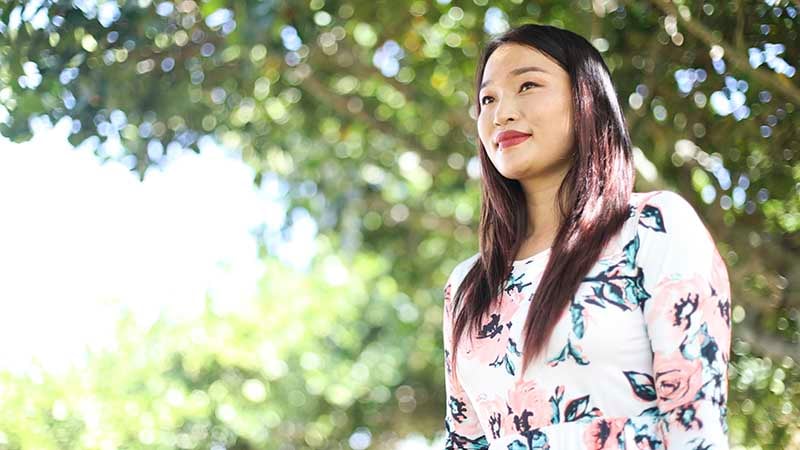
In early April 2020, less than a month after the novel coronavirus was declared a global pandemic, BYU-Hawaii senior Ganchudur “Ganaa” Batgerel fell seriously ill. She suffered from high fever, shortness of breath, coughing, and debilitating pain and weakness, all of which left her bedridden and fearing the worst: “Do I have COVID-19?”
Ganaa wished she could be home in Mongolia with her mother and father. BYU-Hawaii had shut down its campus and shifted to remote instruction, and most students had returned to their homes at the urging of the university. But Ganaa was stuck in Hawaii because Mongolia had closed its borders to all international travelers, including its own citizens.
In addition to not having her parents to help her, Ganaa had a family of her own to care for: her husband, Tuvshinjargal “Tomche” Lkhagvadorj, who was also a full-time student, and their three children, ages six, three, and less than a year. On top of everything else, Ganaa had final exams coming up in a couple of weeks.
The doctor at the campus health center gave Ganaa some cold medicine and a flu test, which came back negative. Several days later Ganaa’s condition worsened, so she went to the hospital emergency room. There she was tested for COVID-19 and received x-rays that showed she was suffering from a bad case of double pneumonia. In that moment of peak anxiety, Ganaa feared for her life.
Fortunately, 10 days after her visit to the emergency room, her COVID-19 test came back negative, and with time, care, and convalescence, Ganaa made a full recovery from the pneumonia.
Although those were scary and difficult days for Ganaa and her family, she realizes now that she was blessed. She had a safe place to live, access to medical care, and friends and Relief Society sisters who stepped in to support her. “They helped me a lot,” says Ganaa. “When I was sick, I couldn’t get out of bed. I couldn’t cook anything for my family. We almost ran out of food .... [They] brought us lunch and dinner many days and helped take care of my children. I felt so much love and support from them, and I felt the love of God.”
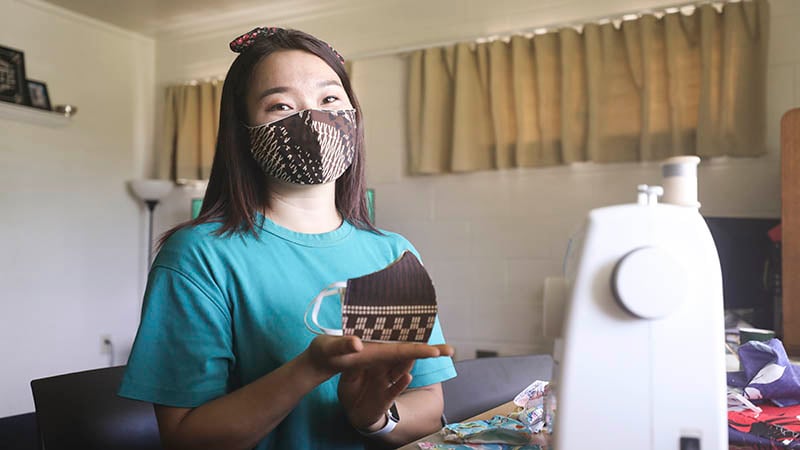
Ganaa knows that not everyone is as fortunate as she is. The love and service she received in her time of need inspired her to find ways to help others. Because the ongoing pandemic was affecting people she knew in both Hawaii and Mongolia, she decided to make face masks. She sews each mask herself from donated material, sells them for $5 a piece, and sends all the money to distressed families in Mongolia.
The first family Ganaa helped has a father who was disabled in a car accident and is unable to provide for his wife and two daughters. Ganaa sent them enough money to feed their family for more than 40 days. “I’m excited to help more families,” she says. “They will be so happy. I want to see their happy faces, and I want to feel that happy feeling. That’s the most amazing feeling.”
Ganaa’s mask-making mission is not her only social enterprise. She is currently developing a nonprofit venture that will provide sustainable support to families in Mongolia.
Ganaa used to work in risk management at the Polynesian Cultural Center, but when the pandemic forced PCC to shut down, she began working as a lead at BYU-Hawaii’s Sustainability Center. The center includes the Temple View Learning Garden, where students and their families volunteer and receive fresh produce, and the Give and Take, where students and community members donate various home goods and supplies, and students can receive things they need.
Sometimes, Ganaa explains, when the Give and Take receives more donations than it can handle, it has to dispose of unwanted items to make room. Rather than throwing away usable supplies, Ganaa collects surplus items and ships them to Mongolia to be sold at cheap prices to families in need. Ganaa wants to use the money to fund small businesses and projects that will help people sustain their families and communities.
The purpose of this venture, Ganaa says, is to help low-income families living in Mongolia’s ger districts. Gers (or yurts) are tent-like homes made of latticed wooden frames covered with layers of felt. Traditionally they were used by nomadic herders, but as people left the countryside for the capital city of Ulaanbaatar, they formed ger districts in the outskirts of the city. These districts make up 70 percent of the population of Ulaanbaatar, according to Ganaa, and typically comprise low-income families suffering from poor living conditions and little opportunity for improvement.
“I want to make their lives a little bit better,” says Ganaa. “It’s a hard life. I used to live that way. And that’s why I want to help them.”
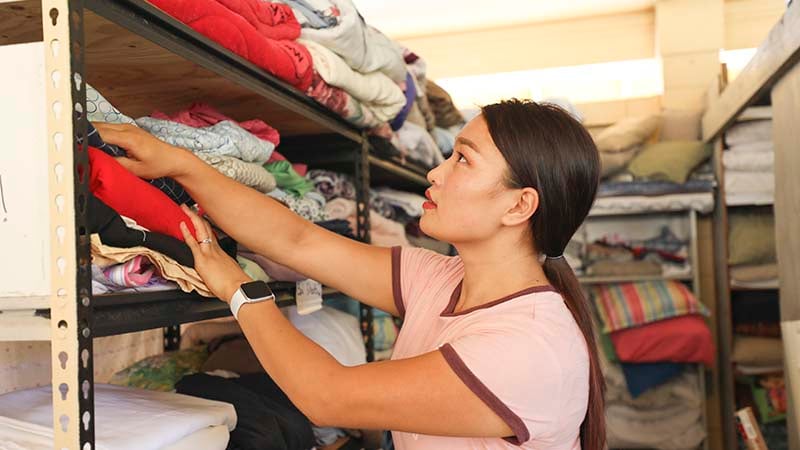 Ganaa collects unwanted items from the BYU-Hawaii Give & Take and ships them to Mongolia to be sold at cheap prices to families in need. She will use the money to fund small businesses and projects that will help people sustain their families and communities.
Ganaa collects unwanted items from the BYU-Hawaii Give & Take and ships them to Mongolia to be sold at cheap prices to families in need. She will use the money to fund small businesses and projects that will help people sustain their families and communities.
Ganaa’s selfless love for others is born out of a deep and abiding faith in the gospel of Jesus Christ - a faith that she found after a profound loss.
Ganaa has two younger sisters and also an older brother who was a cousin until her parents adopted him. Ganaa and her brother grew very close. “He was a very caring and loving person,” she says. Then, when he was 19 years old, he was unexpectedly and tragically killed by one of his own friends. “We were a happy family, but that year my family’s life was turned upside down,” Ganaa recalls. “We felt like we had fallen into a dark hole.”
Reeling from the loss of their son and the betrayal of trust, Ganaa’s parents wanted to find safer social circles for their daughters to protect them from a dangerous society. When her mother heard that “Mormon” youth lived by high standards of morality, she began searching for The Church of Jesus Christ of Latter-day Saints. But without a church building in the area, she didn’t know where to look.
Then one day Ganaa’s mother spotted missionaries leaving the home of a neighbor and excitedly called them over. Ganaa’s parents, who worked tirelessly to provide for their family, didn’t make time for themselves to meet with the missionaries, but they invited the missionaries to teach their daughters. Eventually Ganaa and one of her sisters were baptized. Within the Church, Ganaa found the friends her parents were hoping for. “They are still my good friends today,” says Ganaa. “They are here at BYU-Hawaii with me. Those friends have been a big blessing in my life.”
Although Ganaa’s parents have not joined the Church, they have been very supportive of their daughters’ decision to be baptized, and the entire family has been blessed by having the Spirit in their home and a knowledge of gospel principles. “After I heard about the plan of salvation and temple work, I shared those things with my parents,” says Ganaa. “And our hearts began to heal [from the loss of my brother]. Now we have a hope that we can meet him again someday. The gospel really helped us to heal from those sorrows.”
Ganaa’s conversion to the gospel blessed her in another important way. On the first day she attended church, she met her future husband, Tomche. “He looked very handsome and shining,” she recalls. “I almost fell in love right way. Honestly, he was one of the reasons I wanted to go to church on Sunday and to other activities.”
When Tomche left Mongolia to serve a mission in the Arizona Tempe Mission, Ganaa stayed true to her newfound faith. She also waited for Tomche. Shortly after he returned, they became engaged and later traveled to the Hong Kong China Temple to be sealed for time and all eternity. Even though Ganaa’s parents are not members of the Church, they traveled to Hong Kong with them to celebrate the marriage. “After the sealing,” says Ganaa, “my mother said to me, ‘Hong Kong has so many nice buildings, . . . but the most beautiful building in Hong Kong is your temple.’ I know she was feeling the Spirit.”
On the same day of the sealing, Tomche also performed proxy ordinances for Ganaa’s older brother who was killed. “When my husband was doing my brother’s temple work, I felt a strong feeling that my brother was so happy,” she says. “I felt like he was telling me, ‘Thank you for being a good sister.’ . . . And when I felt that spirit, I forgave my brother’s friend who killed him. I wasn’t mad at him anymore. That day was very, very special.”
Ganaa studied interior design at a Mongolian university but found the line of work unsatisfying. What she really wanted to do was business management. Tomche hadn’t been to college. They both wanted to further their education to improve their life, but with meager finances and a newborn son, they couldn’t afford it on their own.
When they learned about BYU-Hawaii and the donor-funded IWORK program, they both applied. Tomche was accepted right away, but Ganaa, who had not served an English-speaking mission, had to take the English test five times before earning a passing score and being accepted to BYU-Hawaii.
Coming to BYU-Hawaii not only opened educational doors for Ganaa and Tomche, it also saved their marriage. “Just before we were accepted to BYU-Hawaii, my husband and I were having a hard time,” says Ganaa. “Our relationship was not sustainable.” One factor contributing to their marital strain was financial stress. “We were struggling. We were trying and praying so hard to keep our marriage.” When they were accepted to BYU-Hawaii, they saw it as God’s plan for them and an answer to their prayers. As they began supporting each other and working together to achieve their goals, they strengthened their marriage.
But their time at BYU-Hawaii has not been easy. As IWORK students, Ganaa and Tomche carried a full load of classes while working part-time and taking care of-and growing-their family. They carefully coordinated their class and work schedules so that one of them could always be home with their children, and they stayed up to the early hours of the morning to study and complete their class assignments.
“Life is so busy here,” says Ganaa. “But I’m so thankful we have the IWORK scholarship. Without it we couldn’t make it. It sounds hard, and it is, but the hard times are helping us improve. I feel like it’s preparing us for the future. And I’m thankful for the BYU-Hawaii donors,” she adds. “They don’t even know how much they bless students’ lives. I’m so grateful for their service and love.”
Tomche graduated in April 2020 with a degree in information technology, and Ganaa will graduate in December 2020 with a degree in business and supply chain management. “I’m so happy that I’m studying business now,” says Ganaa. “I love my major. It’s what I want to do in my life. BYU-Hawaii is one of the greatest blessings of our life.”
As soon as Mongolia reopens its borders, Ganaa and Tomche plan to return home. Ganaa already has two job prospects lined up in Mongolia. After working with one of them for a few years to gain experience and establish financial stability, Ganaa hopes to start her own business.
But if you ask Ganaa about her long-term goal, she says it’s to work in the Mongolian government. “I don’t know when, but I feel like I need to do that to make some changes that will help the Mongolian people,” she says. “I feel like that’s one of my callings. My patriarchal blessing says, ‘You will be one of the people who will bless your country and change your country’s life.’ I don’t know how, so I’m looking for ways to do that.” Meanwhile, Ganaa plans to continue helping one family at a time through supporting ger district families and sewing face masks.
Make a Gift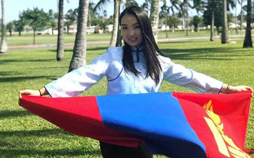
As a freshman at BYU–Hawaii, Flora Enkhbold started a business to sell her mom’s handcrafted ties in new markets.
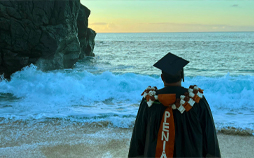
Peniasi’s journey was not easy. Now that he has graduated from BYU–Hawaii, he is determined to help those who face similar challenges.
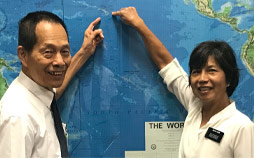
Pioneers in Taiwan, Elder and Sister Chen share their love and faith with future leaders of the Church by donating to BYU–Hawaii.